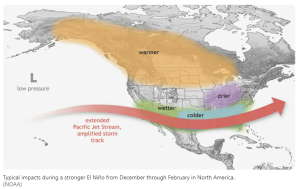
Weather Swings Ahead – Are You Prepared?
The winter season is now in full swing, and volatile weather conditions are expected in the US, with the potential for temperature fluctuations similar to those experienced last year. These weather patterns are influenced by a stronger El Niño, a periodic warming of the equatorial eastern and central Pacific Ocean that can lead to unusual and extreme weather conditions.
While most people brace for cold weather, fleets and businesses relying on diesel fuel must also consider the challenges of diesel operability during winter. Failure to address any issues proactively can lead to costly consequences and operational disruptions. In today’s article, we will discuss the potential impacts of a stronger El Niño and highlight the basic steps to keep your vehicles and machinery running smoothly during the season.
The Impact of a Stronger El Niño
This winter, a stronger El Niño is expected to be in place through spring, and that could mean significant changes in snow, rain, and temperatures.
In the southern United States, encompassing areas from California to the Carolinas, El Niño tends to usher in above-average rainfall. On the other hand, in the northern United States, it typically results in milder winters, offering relief from the harsh cold that these regions might otherwise experience. Furthermore, El Niño’s influence on snowfall is notable, as it can lead to reduced snowfall in the Pacific Northwest, northern Rockies, and upper Midwest while potentially increasing snowfall in certain parts of the mid-Atlantic states.

Winter Diesel Operability
Winterizing diesel fuel is crucial in many parts of the United States, primarily due to the properties of ultra-low sulfur diesel (ULSD): it contains paraffin wax molecules that can crystallize as temperatures drop. As you already know, it can damage the fuel filter, depriving the nozzle or engine of fuel, which can lead to operational shutdowns.
Therefore, fleet managers must adopt a proactive approach to mitigate the risks associated with extreme winter conditions. Key steps should include:
- Onsite Inventory: Maintaining an onsite inventory of cold flow improver, emergency reliquifier, and water dispersant additives is a critical step in preparedness. These additives can help
address various fuel-related issues that may arise during extreme temperatures.
- Fuel Testing Program: a fuel testing program is essential to gain insights into the condition of fuel storage tanks. It should include two types of analyses: bottom sample tests and nozzle sample tests.
- Cold Flow Improver Additive: Cold flow improvers (CFIs) can significantly enhance fuel performance during extreme cold snaps. Administered at the time of fuel delivery, CFIs modify the structure of waxy molecules, preventing them from forming filter-clogging sheets.
- Water Dispersant: Water in diesel fuel can lead to filter plugging and equipment failure. Properly blended water dispersant additives can remove water from diesel, preventing these issues.
It is important to mention that a proactive approach should also include constant monitoring of weather forecasts. It is always important to consider winterizing fuel for protection down to the tenth percentile of historical temperatures in their region. For temperatures beyond that threshold, emergency blending procedures should be implemented.
Through proactive measures, companies can safeguard their fuel supply and equipment performance, ensuring they remain operational even in the harshest winter conditions.
Your Trusted Partner
Mansfield offers extensive coverage and has a proven track record of delivering effective solutions for businesses facing winter fueling challenges.
By working closely with Mansfield, you can benefit from our industry expertise, cutting-edge additives like Arsenal ColdPro, and a commitment to delivering the solutions you need to keep your operations running smoothly during even the harshest winter conditions. With Mansfield, you can navigate the complexities of winter-fueling with confidence and peace of mind. Contact us today!

This article is part of Daily Market News & Insights
Tagged:
MARKET CONDITION REPORT - DISCLAIMER
The information contained herein is derived from sources believed to be reliable; however, this information is not guaranteed as to its accuracy or completeness. Furthermore, no responsibility is assumed for use of this material and no express or implied warranties or guarantees are made. This material and any view or comment expressed herein are provided for informational purposes only and should not be construed in any way as an inducement or recommendation to buy or sell products, commodity futures or options contracts.





